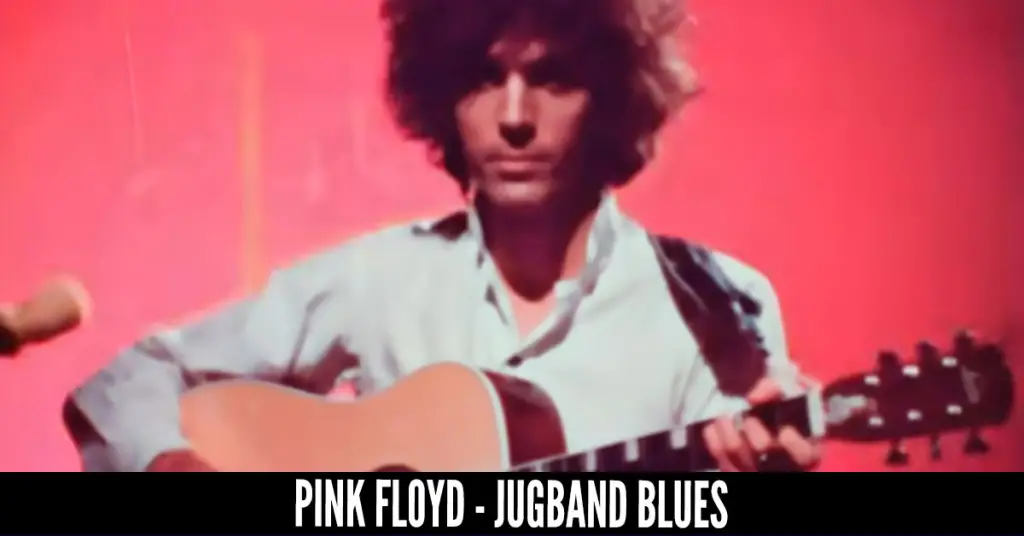Among the many masterpieces in Pink Floyd’s vast and transformative catalog, “Jugband Blues” stands apart—not for its sonic polish or commercial success, but for its raw, disjointed beauty and the emotional weight it carries as Syd Barrett’s last original composition for the band.
Released in 1968 as the closing track of their second album, A Saucerful of Secrets, “Jugband Blues” is more than just a psychedelic oddity—it’s a fractured goodbye, a surreal self-portrait of a man slipping away from his band, his fame, and perhaps even himself.
The Last Song from the Founding Visionary
Syd Barrett was Pink Floyd’s original creative force—a whimsical, wildly imaginative songwriter who helmed their 1967 debut The Piper at the Gates of Dawn. His blend of whimsical British whimsy and mind-expanding experimentation defined early Floyd and made them stand out during the height of the London underground scene.
But by the time A Saucerful of Secrets was recorded, Barrett’s mental health had seriously deteriorated, likely worsened by his heavy use of LSD and underlying psychological conditions. His behavior had become erratic, and his ability to function in the studio—and on stage—was collapsing.

“Jugband Blues” would be the only Barrett-penned track on the album, and it would be his final farewell to Pink Floyd as an active member.
A Fragmented Masterpiece
Clocking in at just under four minutes, “Jugband Blues” defies traditional structure and teeters between clarity and chaos. It opens with a gentle acoustic guitar and Barrett’s voice—wistful, almost childlike—as he sings:
“It’s awfully considerate of you to think of me here / And I’m most obliged to you for making it clear…”
It sounds like gratitude—but quickly reveals itself as biting sarcasm, a veiled swipe at the band and management, who were effectively sidelining him.
As the song progresses, it shifts unpredictably. A brass band stumbles in, playing a seemingly disconnected marching tune that drifts in and out of key—Barrett reportedly gave them no specific music, simply telling them to “play whatever they want.” The result is disorienting, unhinged, and deeply symbolic.
It’s psychedelia unraveling into madness.
Lyrics That Speak from Another Place
“Jugband Blues” feels like Barrett speaking through a veil, aware of his fading presence but still reaching out. The lyrics are poetic, sad, and disturbingly lucid, as if he’s watching himself disappear.
“And what exactly is a dream? / And what exactly is a joke?”
These closing lines echo like a cosmic question—existential, absurd, heartbreaking. It’s the sound of someone caught between realities, using music as a final tether to the world.
Reception and Legacy
At the time of its release, A Saucerful of Secrets marked a transition—from the Barrett era into the more structured, experimental future under David Gilmour, who had already joined the band during the recording. “Jugband Blues” didn’t become a hit, and its impact was more emotional than commercial.
But in the years since, it has gained recognition as a stunning, painful portrait of an artist in decline—and a critical piece of Pink Floyd’s mythos.
To many fans, “Jugband Blues” is not just a song—it’s Syd’s farewell letter, folded in kaleidoscopic paper, signed with sadness, genius, and a touch of madness.
Syd’s Shadow
Syd Barrett would retreat from public life shortly after. Though he released two solo albums (with varying degrees of involvement and clarity), his time in the spotlight was essentially over.
Yet his spirit lingered, haunting the band’s work for decades—from Wish You Were Here to The Wall. Barrett was the beautiful ghost of Pink Floyd, and “Jugband Blues” was the moment he wrote himself out of the story—but not before leaving a final, indelible mark.
Final Thoughts
“Jugband Blues” isn’t easy listening. It’s fragmented, aching, and strange. But it’s also pure Syd Barrett—poetic, unpredictable, and strangely profound. It’s a rare and raw glimpse into the mind of a man losing his grip on reality, captured in sound.
And in that final line, drifting into silence, you can still hear him ask:
“And what exactly is a joke?”
Maybe this song was the punchline.
Maybe it was the warning.
Either way, we’re still listening.


Facebook Comments